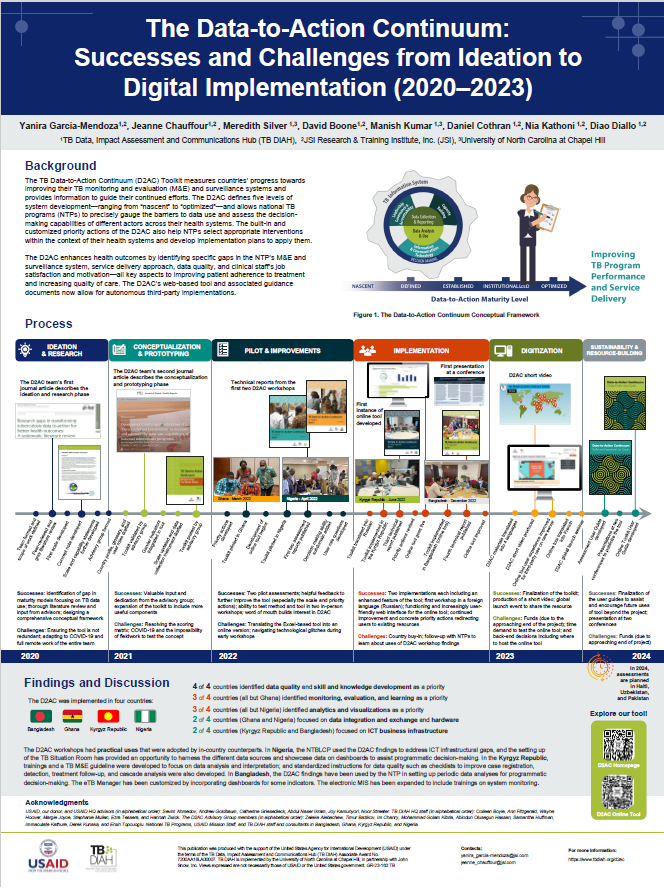The Data-to-Action Continuum: Successes and Challenges from Ideation to Digital Implementation (2020-2023)

Abstract: The poster highlights the development and implementation history (successes and challenges) of the TB DIAH project’s Data to Action Continuum (D2AC), a digital tool developed through a peer reviewed process, and its subsequent uses in Africa and Asia to support national TB programs (NTP) in assessing their tuberculosis data use capabilities and issuing appropriate recommendations to strengthen evidence based decision making. The D2AC has become an important contribution to the digital health landscape as the only known tool focused on TB data use.
The D2AC enhances health outcomes by identifying specific gaps in the NTP’s M&E and surveillance system, service delivery approach, data quality, and clinical staff’s job satisfaction and motivation – all key aspects to improving patient adherence to treatment and increasing quality of care. The information shared can be applied (and encouraged to be applied) by participants using the open source digital D2AC tool to work with their respective NTP and conduct a baseline assessment. There were four successful implementations supported by TB DIAH in 2022.
In 2023, Haiti and Pakistan will be implementing the D2AC with remote support from the D2AC team. The published D2AC materials and the automated digital tool will allow local facilitations. The D2AC, developed through a thorough peer reviewed and gray literature review process (which will also be outlined in the tool development process), applies and meets current toolkit standards, and advances them by applying those methods and approaches to tuberculosis specifically. This presentation highlights the outcomes of the completed implementations, including how the NTPs have used findings from the post D2AC’s custom implementation plan and priority recommendations.
The D2AC enhances health outcomes by identifying specific gaps in the NTP’s M&E and surveillance system, service delivery approach, data quality, and clinical staff’s job satisfaction and motivation – all key aspects to improving patient adherence to treatment and increasing quality of care. The information shared can be applied (and encouraged to be applied) by participants using the open source digital D2AC tool to work with their respective NTP and conduct a baseline assessment. There were four successful implementations supported by TB DIAH in 2022.
In 2023, Haiti and Pakistan will be implementing the D2AC with remote support from the D2AC team. The published D2AC materials and the automated digital tool will allow local facilitations. The D2AC, developed through a thorough peer reviewed and gray literature review process (which will also be outlined in the tool development process), applies and meets current toolkit standards, and advances them by applying those methods and approaches to tuberculosis specifically. This presentation highlights the outcomes of the completed implementations, including how the NTPs have used findings from the post D2AC’s custom implementation plan and priority recommendations.
Shortname: GR-23-163 TB
Author(s): Garcia-Mendoza Y, Chauffour J, Silver M, Boone D, Kumar M, Cothran D, Kathoni N, Diallo D
Year: 2023
Language: English
Resource Type: Infographics
Source: TB DIAH
Filed under: continuum, D2AC, Data, data to action, Guidance, Guidance and Tools, Infographic, TB, technical assistance, Tuberculosis
